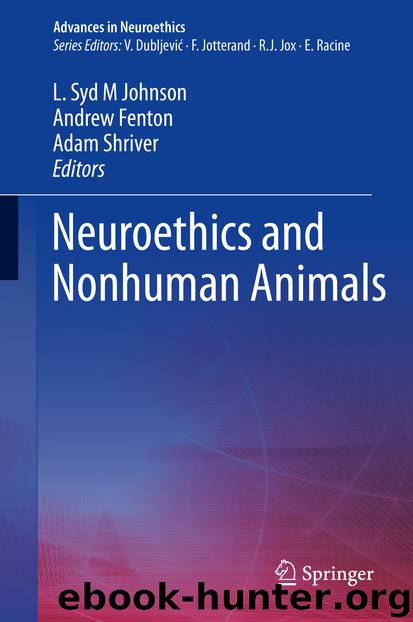Neuroethics and Nonhuman Animals by L. Syd M Johnson & Andrew Fenton & Adam Shriver

Author:L. Syd M Johnson & Andrew Fenton & Adam Shriver
Language: eng
Format: epub
ISBN: 9783030310110
Publisher: Springer International Publishing
9.2 Cognition
9.2.1 An Epistemological Commentary
Modern neuroscience is at a crossroads. Almost 30 years since the beginning of the “decade of the brain”1 neuroscience is not the new kid on the block anymore. It has made its way deep into our understanding of the human condition, as well as our understanding of other animals, including the interpretation of their behavior in neuroethology and neuroecology. I present here a bottom-up perspective on behavior and the brain meant to highlight the similarities between humans and nonhumans and narrow or mitigate the perceived differences. The dangers of speciesism, both its anthropocentric and non-anthropocentric variety, and the idea of a human cognitive and moral hegemony, impact our use of animal models in neuroscience and the clinical sciences in general, but also our attitudes and beliefs surrounding pressing animal conservation issues all around the world.
Instead of emphasizing the exceptionality of humans, the relativist (nonpolarizing and hopefully nondogmatic) and synthetic/integrative perspective presented here points out the failures of a true dialectical synthesis. Despite having all the tools, data, and disciplines in place, we seem to keep on making the same points and emphasizing the same irrational arguments. The scala naturae is so ingrained in our perception and understanding of the nonhuman animal world that it is like walking on a moving sidewalk: We seem to quickly go somewhere with little legwork, but the essence of the problem stays the same—the achievement of a science-informed ethics is an illusion. As we make arguments to save the apes or the whales based on some exceptional socio-affective or cognitive feat, we undermine the rest of the animal kingdom. This attitude is institutionalized as well. For instance, in Canada (see the guidelines of the Canadian Council of Animal Care, CCAC2) and the EU [22] animal research ethics recognizes a fundamental qualitative and quantitative difference between vertebrates and invertebrates (with an intriguing exception for cephalopods) .
The dialectical operation and epistemological development of the neurosciences (and behavioral sciences) seems to have resulted mostly in historical pendulum swings between false dichotomies (nature-nurture , innatism-behaviorism, behaviorism-cognitivism, monism-dualism, overt behavior-covert behavior, etc.) that created a relatively sterile landscape with little common ground or synthesis. This chapter will present what some would describe as a post-Cognitivist view (since Cognitivism is also seen as anthropocentric and anthropogenic [23]), integrating some not-so-new but emergent perspectives in the behavioral sciences and neurosciences. Although not necessarily mainstream, and not necessarily that new (so I hesitate to use the other common label of “neo-Cognitivism ”), post-Cognitivist schools are mostly reactionary to classical Cognitivism and often aggregate elements of sub-movements within mainstream schools.
Download
This site does not store any files on its server. We only index and link to content provided by other sites. Please contact the content providers to delete copyright contents if any and email us, we'll remove relevant links or contents immediately.
Periodization Training for Sports by Tudor Bompa(8237)
Why We Sleep: Unlocking the Power of Sleep and Dreams by Matthew Walker(6685)
Paper Towns by Green John(5164)
The Immortal Life of Henrietta Lacks by Rebecca Skloot(4566)
The Sports Rules Book by Human Kinetics(4367)
Dynamic Alignment Through Imagery by Eric Franklin(4200)
ACSM's Complete Guide to Fitness & Health by ACSM(4041)
Kaplan MCAT Organic Chemistry Review: Created for MCAT 2015 (Kaplan Test Prep) by Kaplan(3993)
Livewired by David Eagleman(3755)
Introduction to Kinesiology by Shirl J. Hoffman(3753)
The Death of the Heart by Elizabeth Bowen(3596)
The River of Consciousness by Oliver Sacks(3589)
Alchemy and Alchemists by C. J. S. Thompson(3504)
Bad Pharma by Ben Goldacre(3413)
Descartes' Error by Antonio Damasio(3262)
The Emperor of All Maladies: A Biography of Cancer by Siddhartha Mukherjee(3134)
The Gene: An Intimate History by Siddhartha Mukherjee(3085)
The Fate of Rome: Climate, Disease, and the End of an Empire (The Princeton History of the Ancient World) by Kyle Harper(3046)
Kaplan MCAT Behavioral Sciences Review: Created for MCAT 2015 (Kaplan Test Prep) by Kaplan(2972)
